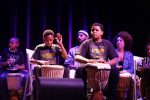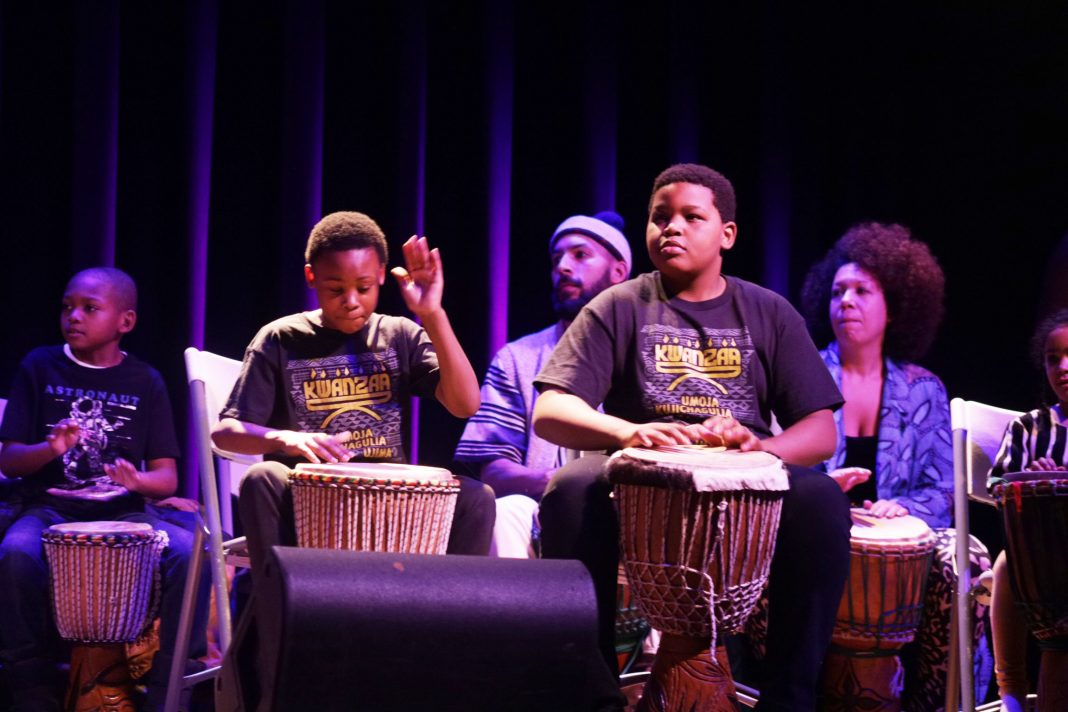
The holiday season is here, and for Kenna-Camara Cottman that means curating Afro-fusion musicals that grip individuals of all ages. This year, Kenna wants to bring attention to Kwanzaa, the African American holiday, which some say has lost popularity among Black youth.
Kenna, who is non-binary and prefers to go by their first name, is promoting Kwanzaa through a series of events they call the Griot Series. It is a project of VOICE of Culture, an organization founded in 2008 in Minneapolis’s Northside neighborhood to promote Black American arts and culture and will host various cultural events throughout the year.
One of the shows, held on Monday in Minneapolis at the Cedar Cultural Center, spotlighted the African American holiday of Kwanzaa by drawing on traditional African storytelling in a series of vocal and drum performances.
“I wanted to increase access and engagement with Black arts and culture in the Cedar-Riverside neighborhood by bringing together my community of artists in a unique way,” said Kenna.
Despite increasingly progressive attitudes towards multiculturalism, Kwanzaa, which was once a popular holiday, has over the years slipped into obscurity. It was erroneously dubbed the “Black Christmas,” and has been the subject of ceaseless controversy, with claims from Black and white people that it promotes segregation. Particularly amongst the younger crowd, Kwanzaa’s popularity has waned significantly compared to just a few decades ago. Through the Griot Series, Kenna seeks to promote a deeper understanding about Kwanzaa and hopefully restore its true meaning.
The origins of Kwanzaa go back to the 1960s when Ronald McKinley Everett, a prominent African American college professor and civil activist, began to think of ways to keep Black Americans connected to their African roots. He adopted the Kiswahili name Maulana Karenga and in 1966 he organized the first Kwanzaa celebration. In response to growing racial tensions in the United States, Karenga sought to unite and empower his community, especially after riots devastated the predominantly Black neighborhood of Watts in Los Angeles. The name Kwanzaa is derived from the Swahili phrase “matunda ya kwanza,” which means “first fruits.” Karenga drew inspiration from traditional African harvesting festivals in his ideation of the holiday. As Kwanzaa steadily gained traction in Black America through the 1970’s and 1980’s, it became an African American cultural holiday, hallmarked by feasting, gift-giving, and remembrance of their African heritage.
Kenna, who is the child of community leader and professional storyteller Auntie Beverly, said that their family celebrates Kwanzaa in different ways each year. In addition to organizing events, Kenna works with Black youth to educate them about African and African American culture and history.
“It’s always fun to raise folks of all ages’ awareness and create new avenues to uplift Blackness in those spaces,” Kenna said.
Throughout the night, performers bridged Africa and America leading the audience through the villages of Guinea and then into the Deep South as they switched from a djembe ensemble to gospel tunes. It was a juxtaposing mélange of explosive percussion and lullaby-like melodies that had even the youth on their feet. Children younger than 5 could not be contained as they gamboled across the center of the room. When Kenna conducted the drummers into an ancestral chant, a group of children broke out in a semi-uniform dance number screaming, “Ashe!” which translates loosely to “power” in the Yoruba language and honors the power of the ancestors.
When vocal powerhouse duo Jayanthi RaJaSa and Alicia Jameel broke out into a funky rendition of Odetta Holmes’ “This Little Light of Mine,” the audience erupted. Some grooved to the steady beat, while others nodded. As the singers transitioned from belted choruses to a harmonized outro, the audience grew even more restless. But silence soon swept the room again as they awaited the next set.
Throughout the night, there was a recurring chant of “Umoja! Kujichagulia! Ujima! Ujamaa! Nia! Kuumba! Imani!” the Seven Principles of Kwanzaa, which translate to unity, self-determination, collective work and responsibility, cooperative economics, purpose, creativity, and faith, respectively. For each of the seven days of Kwanzaa celebration, a candle is lit to represent each of the principles.
In the latter half of the show, Kenna presented the Kwanzaa table, which was adorned with traditional items, many symbolic in nature. The kinara or candleholder, sat in the middle of the table on the vibrantly tie-dyed mat known as mkeka. On the kinara were seven pan-African colored candles – three red ones to represent the struggle, three green ones to symbolize hope for the future, and a black one to represent the people of the African diaspora. Also on display was mazao (the fruit to represent the harvest), zawadi (gifts), and mahindi (the corn representing children). Kenna invited the youth performers to gather around the table and give short recitations affirming their Black identities, which included a chant in Kiswahili and a tribute to Marcus Garvey, the late Jamaican-born advocate and pan-Africanist.
Attendees lingered after the show to chat, grab refreshments, and purchase handmade African crafts at the featured tables. Local rapper Fanaka Nation, who was one of the last to leave as he laughed heartily in conversation with other attendees, said that Kwanzaa recognition is especially important in states like Minnesota, where African American representation lags in the shadows of Eurocentric cultural norms. Reiterating the spirit of umoja, he said the event was a heartwarming way to spend a cold winter evening.
“It’s so awesome they were able to organize this here in Minneapolis,” he said. “It really gets me excited for the holidays.”
About Panashe Matemba-Mutasa, Mshale Reporter
Panashe is a general assignments reporter. She is a graduate of the University of Minnesota and a UC Berkeley Graduate School of Journalism Class of 2025.








